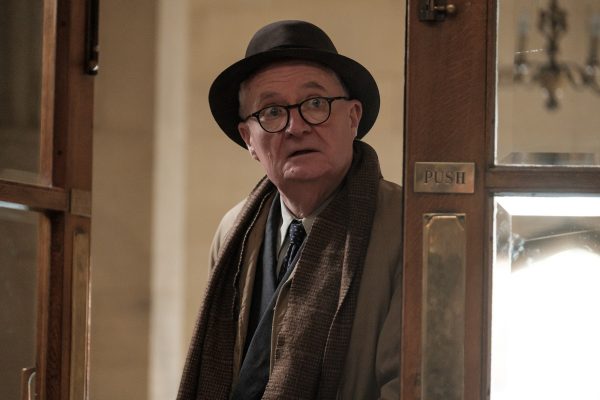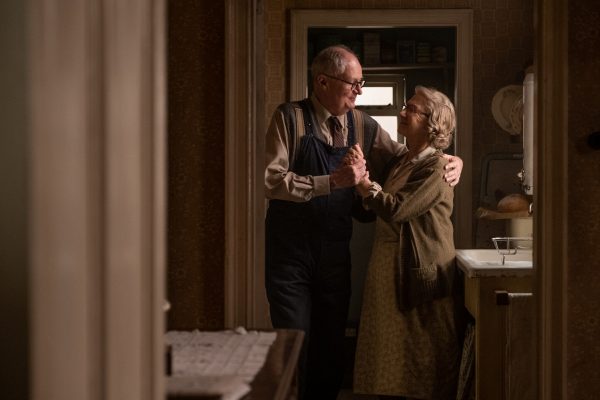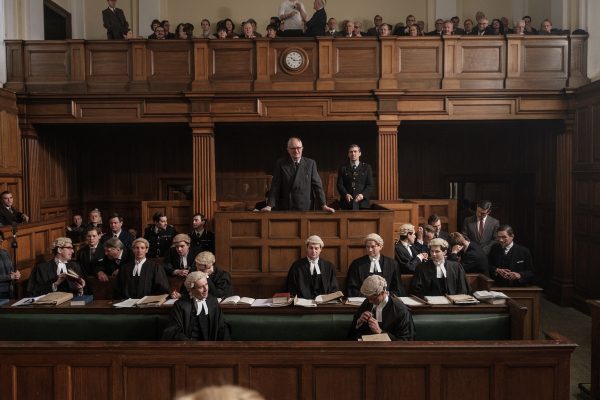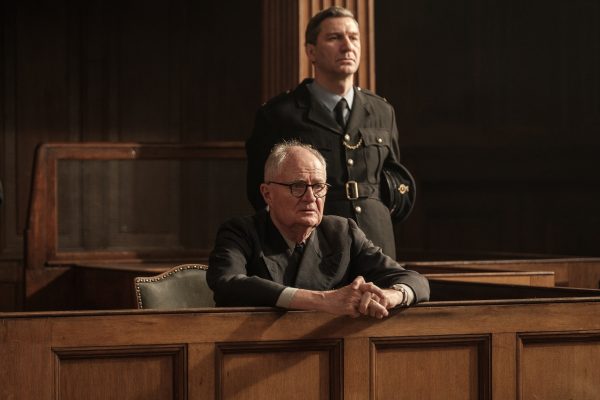‘The Duke’ presents lessons in idealism, compassion, discernment

“The Duke” (2020 production, 2022 release). Cast: Jim Broadbent, Helen Mirren, Fionn Whitehead, Matthew Goode, James Wilby, Jack Bandeira, Aimée Kelly, Charlotte Spencer, John Heffernan, Heather Craney, Anna Maxwell Martin, Richard McCabe, Andrew Havill, Charles Edwards, Ashley Kumar, Craig Conway. Director: Roger Michell. Screenplay: Richard Bean and Clive Coleman. Web site. Trailer.
Standing out often means standing alone, especially for proponents of particular causes. Individuals who embrace this stance frequently must engage in striking, sometimes-outlandish behavior that gets them noticed in order to get their initiatives noticed. But having to go to such lengths can be exasperating, frustrating and even legally challenging. So it was for an eccentric activist in early 1960s England as seen in the new fact-based comedy-drama, “The Duke.”
Kempton Bunton (Jim Broadbent) has great expectations of himself. The 60-year-old Newcastle resident and wannabe playwright/political activist wants to make a name for himself, though more so for the causes he believes in and the statements he wishes to make than from hauling in a bundle of cash. Nevertheless, all well-meaning aside, money is something of an issue in the Bunton household, primarily due to Kempton’s inability to hold down a steady job. The principal breadwinning responsibilities fall to his wife, Dorothy (Helen Mirren), a cleaning woman who slogs away in the home of an influential, well-to-do councilman. And Kempton’s son, Jackie (Fionn Whitehead), contributes, too, bringing in money from his job refurbishing boats.
In attempting to carry out his grand plans, Kempton can be something of a loudmouth and a scallywag, sometimes even being less than truthful with others, including his own wife. That’s also true on the job, including on stints as a cab driver and a baker, positions where he’s often seen as difficult, annoying and a rabble-rouser. And, whenever he deals with authorities in officialdom, he’s seen as uncooperative, a malcontent and a scofflaw, incidents that get him in trouble, including landing him in jail. Dorothy frustratedly looks on these exercises in what she sees as frivolous mischief, leaving her head spinning and prompting her patience to grow ever thinner.
This is particularly true when it comes to Kempton’s protests over government-required licenses for household television sets, a fee aggressively sought after by determined collection agents from the local post office. He firmly believes that TV has become a new source of valued companionship for the lonely among Britain’s citizenry, especially elderly pensioners and veterans living by themselves, and that they shouldn’t have to pay the requisite license fees. He attempts to set an example by using a loophole in the license law to avoid paying his own fee, but officials will have none of it and swiftly haul him off to jail for a two-week sentence.

However, even with that punishment, he refuses to let go of the issue. He and Jackie start a petition drive for the cause, but it essentially goes nowhere. He realizes he needs another plan to raise visibility for his campaign. But, given the somewhat trivially bureaucratic nature of what he’s proposing, it’s difficult to generate support. He needs something provocative and attention-grabbing to win over advocates. And, interestingly enough, the idea comes to him while on a trip to London.
Kempton makes the trip in the pursuit of two goals. His first is to drum up support for one of the many teleplays he has submitted to the BBC, hoping that the network will finally accept and produce one of his works, all of which have previously been rejected. His second is to pitch one of the London dailies on the veracity of his campaign to scale back the TV license fee requirements. Unfortunately, both efforts fail, but, while reading a discarded newspaper over lunch in Trafalgar Square, he finds his inspiration.
He reads an article about the immense popularity of a painting that’s recently been added to the collection at the National Gallery. The work is a portrait of the Duke of Wellington by painter Francisco Goya, one that the British government snatched out of the hands of eager American interests. The painting was considered a plum acquisition, a purchase highly touted by officials. Kempton even recalled seeing a TV broadcast about it featuring Home Secretary Rab Butler (Richard McCabe) and National Gallery Director Sir Philip Hendy (Andrew Havill). But, when Kempton learned how much the government spent on the acquisition of a painting – £140,000 – he was outraged. How could officials in all good conscience, he mused, expend a sum like that on a portrait when the funds could have been put to what he considered to be better use – like buying television licenses for pensioners and elderly veterans?
Given that the painting was now very much in the public eye, Kempton surmised, if anything were to happen to it, its fate would attract considerable attention. If, perhaps, it were to be stolen and held for ransom by someone seeking to raise awareness for a particular cause, such as the one Kempton was promoting, the attention sought by its pilferer just might follow. And, when the picture actually disappears not long thereafter, officials begin searching in earnest for its recovery.

With the portrait in Kempton’s possession, he and Jackie scramble to hide it and issue ransom demands. But things don’t quite go as planned. To begin with, concealing the portrait proves difficult in several ways. Kempton needs to keep Dorothy from finding it, knowing that she’d throw a fit if she found it in her home. He also has to hide it from unexpected house guests, such as his older son, Kenny (Jack Bandeira), a small-time criminal from Leeds who’s visiting to avoid thugs on his tail. Kenny’s accompanied by his new girlfriend, Pammy (Charlotte Spencer), a savvy, shrewd, perceptive sort who rarely misses a trick – or an opportunity – especially when reward money for a certain lost painting is on the line.
As all this is going on, Kempton mails ransom notes to authorities, but, given their cryptic and sometimes-flowery prose – products of his attempts at being a playwright – they’re not taken particularly seriously. He eventually goes so far as to mail the National Gallery tag that had been affixed to the back of the painting to get some attention. But, despite this evidence, officials like Police Commissioner Sir Joseph Simpson (Charles Edwards) remain skeptical of its legitimacy, convinced that the portrait couldn’t possibly have been stolen by an amateur (like Kempton) but that the theft had to have been the work of professional criminals, like “organized Italian gangs.”
Before long, the truth emerges about how the painting came into Kempton’s possession, leading to its retrieval and a trial in London’s Old Bailey, where the alleged perpetrator at last faces his accusers in what is a very circus-like environment. In a proceeding led by curmudgeonly Judge Aarvold (James Wilby), Kempton is politely grilled by eloquent prosecutor Neddie Cussen (John Heffernan), while overwhelmed defender Jeremy Hutchinson (Matthew Goode) does his level best to minimize the severity of the penalties likely to be imposed on his client. And, if all of these absurd judicial hijinks weren’t already enough, Kempton adds a splash more of his own into the mix when he presents his pleadings – not guilty on all charges.

With this, the stage is thus set for a lively and colorful end game. It’s a proceeding full of surprises in which the defendant’s fate rests on principles that transcend purely litigious matters, opening the door for loftier notions to come into play, ideas that bring new meaning to the word “civil” in “civil proceedings.” And, given how everything began, it’s astounding how events ultimately turned out, including some developments that emerged well after the fact but nevertheless can trace their roots to the legacy of this unconventional landmark case.
Being an idealist is a noble but often-lonely, often-misunderstood pursuit, a mantle that can easily leave one isolated or even persecuted. However, the intents driving such individuals frequently come from an obscured, overlooked place of goodness and fairness. It may take time, effort and discernment to see this, because these altruists frequently must resort to extreme measures just to get themselves and their messages heard. But those who are willing to give them a listen may be pleasantly surprised at what they have to say.
That’s what Kempton Bunton was up against when he sought to make his views known. And many looked upon him as a radical eccentric, one whose messages were far from mainstream, often viewed as fringe, even zealously fanatical. But one quality no one could doubt was his sincerity. He believed in what he was doing, largely because his actions reflected who he was deep down inside. But, more than that, he clung to his romanticized notions in the belief that he could one day make them happen, materializing them in line with his heartfelt hopes. Such is the aim of the conscious creation process, the philosophy that maintains we draw upon these intangible resources in manifesting the reality we seek. Bunton may not have heard of this philosophy, but he certainly practiced its principles, even if he didn’t always attain success in their fulfillment. Nevertheless, in light of his determination and tenacity, on some level he obviously believed that one day he would.

Kempton’s drive was fueled by the tremendous faith he possessed. It bolstered his convictions, as if he were putting his beliefs on steroids, energizing and galvanizing their potency. That faith was further enhanced by his sense of personal integrity, his ability to be true to himself and his beliefs. That’s very much the case with other qualities that he held in high regard, such as compassion and concern for others, traits readily apparent in his efforts to promote his various causes. With all of those elements working in tandem, he concocted a refined recipe for success.
Most of the time, that is.
If Kempton had an area in need of improvement, it would have been his beliefs associated with discernment. He was often so convinced he was right that he didn’t always take into account the views of others. He frequently assumed that they would take an interest in his causes equal to his own. But there were certainly more than enough instances where they would disagree with his notions or simply not place the same degree of emphasis on them as he did. Yet he would carry on his quixotic campaigns with relentless fervor, aiming for success by hook or by crook, with little regard for others’ enthusiasm. And that lack of backing was often his undoing, one brought about by a fundamental miscalculation on his part.
This is apparent, for example, when he’s working his short-lived baking job. While on a break with his co-workers, the bakery boss, Mr. Walker (Craig Conway), enters the employee lunchroom and begins verbally abusing Kempton’s Pakistani co-worker, Javid (Ashley Kumar). Walker tells Javid to get back to work, despite the fact that he still has time left on his break. Kempton stands up for his colleague, calling out the boss for his bullying and prejudicial racist treatment, especially since he makes no comparable demands of any of the other workers, all of whom are White. Javid even pleads with Kempton that there’s no need to intervene on his behalf, but the idealist won’t hear of it and continues berating Walker. One can only guess where this leads as another miscalculation blows up in Kempton’s face.

Still, there were times when he succeeded in skillfully winning over allies. He believed that he could sway the views of collaborators, but it became a matter of convincing the right co-creators, those who understood what he was trying to accomplish. That was the result of those supporters using their own capacity for discernment to grasp and appreciate what he was attempting. This is perhaps best evidenced in the film by the efforts of his defender, who eloquently put forth arguments in his client’s favor, helping the judge and jury understand Kempton’s unconventional tactics in a way that they hadn’t previously considered. By presenting arguments that put a previously overlooked spin on Kempton’s plans, Hutchinson enabled his client to be seen in a totally new light. The idealist was at last allowed to shine.
Director Roger Michell’s final narrative feature serves up a whimsical offering that puts a spotlight on the importance of being kind, compassionate and civil, a message that deserves greater importance and attention in days like these. This delightful, fact-based tale tells a story that blends elements from such diverse sources as O. Henry, James Thurber and Miguel de Cervantes, along with fine early 1960s period piece production values. In addition to its primary narrative, the film incorporates several subplots involving Kempton’s efforts to sell a play based on the death of his daughter in a tragic bicycle accident, the polar opposite courtships of his two sons and their decidedly different love interests, and the playfully stormy relationship of the protagonist and his wife, as well as a few surprises along the way. And then there are the spot-on performances of Broadbent and Mirren, both of whom are truly in their element here. Admittedly, the film probably would have worked better if it played off the humor aspect more than it does (particularly in the first hour and especially given the available talent pool in this cast), especially given the prevalence of the many secondary stories. But the picture redeems itself well the further viewers get into it, especially in the final act, presenting a feel good message that’s genuine, heartfelt and in need of being heard. Give this one a little time to develop, and you’ll be richly rewarded by film’s end. After a protracted release delay caused by the COVID-19 pandemic, this 2020 production has finally made its debut, playing in theaters.
What a world it would be if all of the Kempton Buntons on the planet were able to successfully have their say. Given the sense of compassion, kindness and civility propounded by such idealistic individuals, this might be a much better place for us all. But getting the message out might be half the battle. Finding the right wording, the right medium and the right time, as well as being able to drown out the noise that keeps these altruistic spokespeople from being heard, may be necessary elements to factor into the materialization belief mix. With an appropriate degree of discernment, backed by all of the other elements discussed earlier, the correct formula may readily be at hand, making it possible to manifest a world truly fit for a duke.
Copyright © 2022, by Brent Marchant. All rights reserved.



